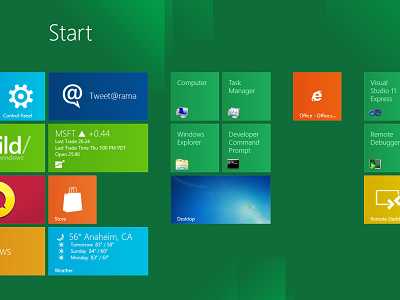Nvidia, Qualcomm Outs Win 8 ARM Test PCs to Devs, Makers
Nvidia and Qualcomm are releasing Windows on ARM test PCs to developers and manufacturers sporting Tegra 3 and Snapdragon S4 SoCs respectively.
During Mobile World Congress in Barcelona, Nvidia said that it's working directly with Microsoft to distribute Windows on ARM desktop PCs powered by the 4-Plus-1 architecture of the Tegra 3 SoC. These PCs, part of a seeding program, will be for software developers and device manufacturers so they can create "a rich ecosystem" of apps and devices for Windows on ARM-based processors.
"Nvidia has a long record of supporting software developers working on the cutting edge of innovation,” said Tony Tamasi, senior vice president of content and technology at Nvidia. "We’re furthering this tradition by helping to realize the extraordinary potential of Windows on ARM processors, like Tegra 3."
Still, the mention of a Tegra 3-based PC offers an indication that Tegra 3 4G LTE-capable desktops and notebooks may be available when Windows On ARM supposedly ships later this year. Nvidia didn't mention tablets in its announcement on Wednesday, but unnamed sources say Microsoft has a stock of Tegra 3 developer tablets already on-hand.
In addition to Nvidia, Qualcomm said that it too has joined Microsoft's Windows On ARM developer seeding plan, and is providing Snapdragon-based test PCs to select developers so they can test and optimize apps for forthcoming Snapdragon-powered Windows on ARM PCs and tablets. Yes, you read that right.
"This invitation-only program will combine a pre-release version of Windows on ARM with next-generation, high performance Snapdragon S4 test PCs," Qualcomm said on Wednesday. "These test PCs are not representative of commercial form factors or the final Windows on ARM experience; they are designed to give developers early access to building and testing Windows Metro style apps on Qualcomm's latest technology."
The Snapdragon S4 test PCs will have built-in 4G LTE technology which will be activated in some regions, the company added.
The Windows on ARM developer seeding program, according to Qualcomm, will help ensure that Windows Metro style apps available in the Windows Store "work great on all Windows 8-based PCs, including those with Qualcomm's ARM-compliant Snapdragon processors."
Get Tom's Hardware's best news and in-depth reviews, straight to your inbox.
The news seemingly puts to rest previous rumors indicating that Windows On ARM would be delayed. Microsoft said it was aiming to release the new OS alongside the x86 and x64 versions of Windows 8, but a lack of non-restricted demonstrations and a uncertainty amongst several manufacturers led to speculation that Windows On ARM wouldn't arrive until early next year. Still, a delay would be understandable given that Microsoft was working outside the comfortable x86/x64 realm.
Are the days of the big rigs finally coming to a close? Will all the powerful hardware be pushed off into the cloud, allowing these smaller desktops and tablets to merely act as receivers?

Kevin Parrish has over a decade of experience as a writer, editor, and product tester. His work focused on computer hardware, networking equipment, smartphones, tablets, gaming consoles, and other internet-connected devices. His work has appeared in Tom's Hardware, Tom's Guide, Maximum PC, Digital Trends, Android Authority, How-To Geek, Lifewire, and others.
-
saturnus ReplyAre the days of the big rigs finally coming to a close? Will all the powerful hardware be pushed off into the cloud, allowing these smaller desktops and tablets to merely act as receivers?
Maybe not just yet but we're getting there.
Even geeks like us must start to realize that the days of huge gaming rigs are coming to an end as companies realize that the average consumer aren't interested and can soon get the same gaming experience from a thin device on cloud service instead. Saving investment cost for the consumer and saving enormous amounts of energy in the process. -
house70 "Are the days of the big rigs finally coming to a close? Will all the powerful hardware be pushed off into the cloud, allowing these smaller desktops and tablets to merely act as receivers?"Reply
Hell no, not as long as the telecom monopolies will charge us an arm and a leg for a slice of capped bandwidth. -
zachusaman "Are the days of the big rigs finally coming to a close? Will all the powerful hardware be pushed off into the cloud, allowing these smaller desktops and tablets to merely act as receivers?"Reply
as soon as my tablet or cloud based whatever can play some games at max settings (angry birds doesnt count) then maybe... but truthfully the answer will always be no. -
bustapr you should work better with your titles. had to read this one a few times to understand what it meant.Reply -
redeemer For sure the death of the 'big rigs' is imminent. Smaller form factors are the future, we can already see this happening with the arrival of tablets and super smart phones. AMD, Intel, Nvidia, and ARM are creating power soc's with powerful graphics and cpu's on one die. Though we will still have desktop comptuers though in the form of ' all in one pc' with touch screens. AMD's Trinity and Intel HD4000 is aorund the corner so lets see!Reply -
boiler1990 ReplyAre the days of the big rigs finally coming to a close? Will all the powerful hardware be pushed off into the cloud, allowing these smaller desktops and tablets to merely act as receivers?
What am I supposed to watercool then? -
atikkur gaming with avatar movie quality graphics at Super HD res stilll not accomplished yet... so why end? gpu tech advancement is still needed, we need pc graphics realm to the next level.Reply -
erunion I wonder if certain parties are unhappy with how WOA is turning out. How else do you explain deliberately false statements like this?Reply
"'There's no difference between ARM and Intel with respect to Windows 8,' he added."
